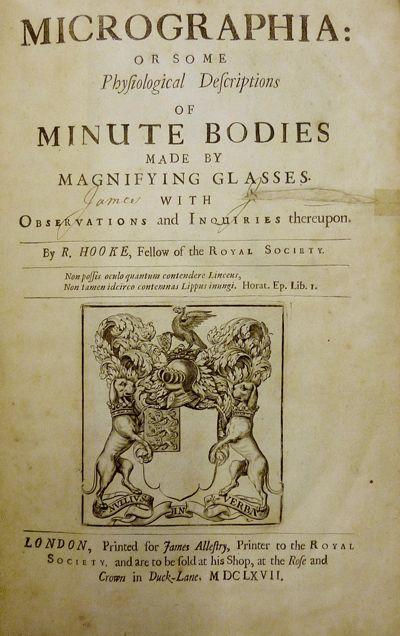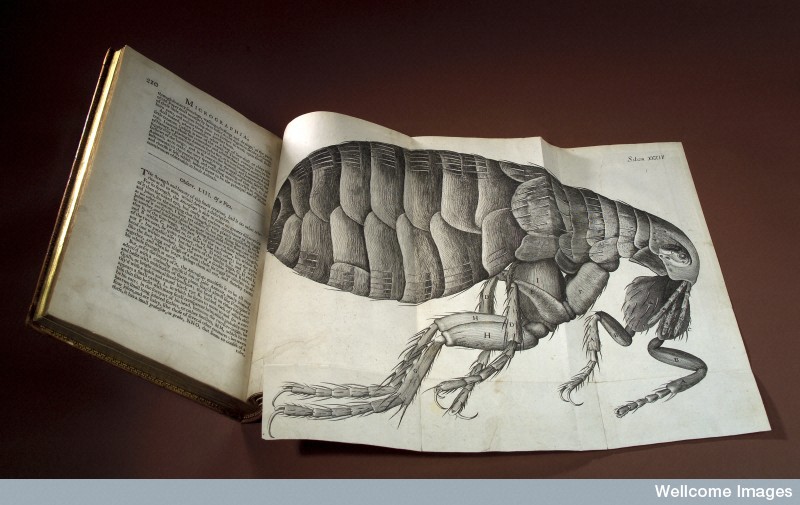1. In everything we read, track the use of "head" and "hand." What does this separation of categories suggest? How are the categories treated in scientific writing?
2. Read the anthology introduction carefully. Extract its main points. Indicate what you learned from the introduction that helped you in your thinking.
3. What does the microscope add to knowledge?
|| What does the microscope do to images? In what sense is the image produced by a microscope "real" and in what sense is it distorted? What is the relationship between distortion and truth?

See for additional evidence a section from Alexander Pope's Essay on Man:
The bliss of man (could pride that blessing find)
Is not to act or think beyond mankind;
No pow'rs of body, or of soul to share,
But what his nature and his state can bear.
Why has not man a microscopic eye?
For this plain reason, man is not a fly.
Say what the use, were finer optics giv'n,
T' inspect a mite, not comprehend the heav'n?
Or touch, if tremblingly alive all o'er,
To smart and agonize at ev'ry pore?
Or, quick effluvia darting thro' the brain,
Die of a rose in aromatic pain?
If nature thunder'd in his op'ning ears,
And stunn'd him with the music of the spheres,
How would he wish that heav'n had left him still
The whisp'ring zephyr, and the purling rill?
Who finds not Providence all good and wise,
Alike in what it gives, and what denies?
What does Pope imply about heightened sensory powers?

4. Archive of the Transactions of the Royal Society: http://rstl.royalsocietypublishing.org/content/by/year
What did you learn from your exploration of the Transactions of the Royal Society?
How is the collection of miscellaneous information and the production of images under a microscope disturbing to people committed to a traditional form of knowledge?
5. What issues does Voltaire bring into view in Micromegas? Is Voltaire's work a satire of new scientific work or an exploration of its possibilitites?
6. If you had a chance to look at the chapters from Gulliver's Travels, how do you think scientific work is translated into satire?
7. The modest proposer says, "and it is exactly at one year old that I propose to provide for them in such a manner as, instead of being a charge upon their parents or the parish, or wanting food and raiment for the rest of their lives, they shall on the contrary contribute to the feeding, and partly to the clothing, of many thousands" (524). || Analyze this statement in order to explain Swift's use of irony. What does Swift's proposal have to do with the new science?
8. Explain the ironic force of the following sentence;
There is likewise another great advantage in my scheme, that it will prevent those abortions, and that horrid practice of women murdering their bastard children, alas, too frequent among us, sacrificing the poor innocent babes, I doubt,2 more to avoid theexpense than the shame, which would move tears and pity in the most savage and inhuman breast.
9. Analyze the following section carefully:
The number of souls in this kingdom being usuallyreckoned one million and a half, of these I calculate there may be about two hundred thousand couple whose wives are breeders, from which number I subtract thirty.
10. In the interests of clarifying our purposes, I am providing some examples of close analysis.
a. A Modest Proposal text:
" I think it is agreed by all parties that this prodigious number of children in the arms, or on the backs, or at the heels of their mothers, and frequently of their fathers, is, in the present deplorable state of the kingdom, a very great additional grievance; and therefore, whoever could find out a fair, cheap, and easy method of making these children sound and useful members of the commonwealth would deserve so well of the public as to have his statue set up for a preserver of the nation."
b. Analysis:
The speaker explicitly aims for agreement (“agreed by all parties”) and implicitly does so as well by bringing his readers together to recognize the impoverished condition of poor families: children too numerous, parents unable to provide for them. They (speaker and contemporary reader) are both at the outset apparently benevolent but they also probably agree that destitution and begging are deplorable for the kingdom. In a subtle shift, the projector's voice moves away from the condition of the parents and children to an interest in the children's potential utility. Utility in itself is not an offensive aim, but the speaker's terms (“cheap, and easy method” and “making these children sound and useful members of the commonwealth”) begin to jostle with his apparent philanthropic aims. The position created for the reader by the speaker becomes intolerable. The speaker has tricked the reader into agreeing, ever so momentarily, with the inhumanity of cannibalism, as the undernourished children of the poor become nourishment for others. The satire works because the ironist temporarily lulls the reader into horrific agreement.
David Hume's "On Miracles"
1. Definition of "miracle" from OED: " a. A marvellous event not ascribable to human power or the operation of any natural force and therefore attributed to supernatural, esp. divine, agency; esp. an act (e.g. of healing) demonstrating control over nature and serving as evidence that the agent is either divine or divinely favoured."
What do you gather, infer, conclude from the examples below:
1699 Bp. G. Burnet Expos. 39 Articles iv. 62 A Miracle is a Work that exceeds all the known Powers of Nature.
1710 M. Chudleigh Ess. Several Subj. 212 The peculiar Favourites of Heaven, a People preservd by Wonders, and conversant with Miracles.
1756 tr. J. G. Keyssler Trav. I. 382 A St. Ignatius performing a miracle, by Rubens on another altar.
1812 R. Southey Omniana I. 270 The night mare has been a fruitful source of miracles and diablery in the Romish mythology.
1865 J. B. Mozley Miracles i. 5 Miracles or visible suspensions of the order of nature for a providential purpose, are not in contradiction to reason.
1887 R. F. Burton tr. Arabian Nights' Entertainm.: Suppl. Nights III. dxci. 190 Hast thou no fear of Allah that thou killest Fatimah, this saintly woman, whose miracles are far-famed?
1924 G. B. Shaw St. Joan ii. 23 An event which creates faith does not deceive: therefore it is not a fraud, but a miracle.
1958 G. Greene Our Man in Havana ii. i. 72 There were miracles too; a virgin wept salt tears and a candle lit before our Lady of Guadalupe burnt inexplicably for one week.
1988 M. Dibdin Ratking 4 The poor pray for miracles, the poor think they have a right to them.
2. Do you ever use the words "miracle" or "miraculous"? Do you mean by it what Hume declares as its definition at the beginning of his essay?
A miracle is a violation of the laws of nature.
3. Hume's second sentence says that reasoning from experience has demonstrated that miracles cannot happen. Paraphrase his sentence. Why can he say that the proof against a miracle is as strong as any argument from experience can be? If you want to object (disagree), what are the grounds for your disagreement? Why is this claim important to his essay overall?
as a firm and unalterable experience has established
these laws, the proof against a miracle, from the very
nature of the fact, is as entire as any argument from
experience can possibly be imagined.
4. What particular miracles does Hume seem to be saying are false?
5. If you believe in miracles--any miracles--what do you have to concede to Hume in order to make your argument persuasive?
What argument could you make against Hume's?
6. How do you "read" Hume's last paragraph? What do you want to say back to it or say against it? Or what do you want to say in praise of Hume?
So that, upon the whole, we may conclude that the
Christian religion not only was at first attended with
miracles, but even at this day cannot be believed by any
reasonable person without one. Mere reason is insufficient
to convince us of its veracity. And whoever is
moved by faith to assent to it, is conscious of a continued
miracle in his own person, which subverts all the
principles of his understanding, and gives him a determination
to believe what is most contrary to custom and
experience.
|

